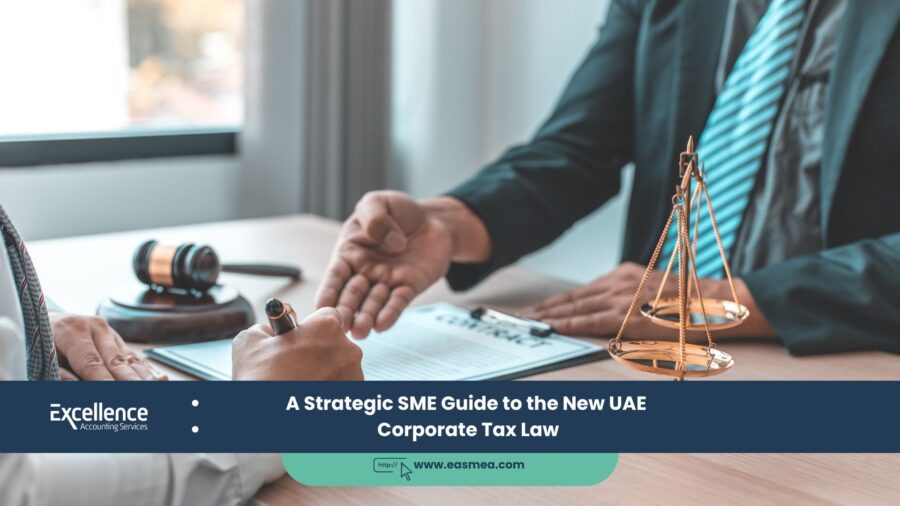A Strategic SME Guide to the New UAE Corporate Tax Law
For years, the UAE has been a beacon for entrepreneurs and Small and Medium-sized Enterprises (SMEs), fueled by a dynamic, low-tax environment. The introduction of the Corporate Tax (CT) Law marks the most significant evolution in this landscape. While the term “tax” can be intimidating, the new regime is designed to be one of the most competitive in the world, with features specifically aimed at supporting the SME sector that forms the backbone of the nation’s economy. For SME owners, this is not a time for apprehension, but for strategic adaptation.
- A Strategic SME Guide to the New UAE Corporate Tax Law
- Part 1: The Core Principles - Corporate Tax in a Nutshell
- Part 2: The Golden Ticket - Are You Eligible for Small Business Relief?
- Part 3: Calculating Your Taxable Income - The SME's Financial Health Check
- Part 4: Your New Compliance Checklist
- Part 5: Upgrading Your Toolkit - The Role of Accounting Software
- What Excellence Accounting Services (EAS) Can Offer
- Frequently Asked Questions (FAQs) for SMEs
- Navigate the New Tax Law with an Expert Partner.
Understanding and integrating the Corporate Tax law into your business operations is no longer optional; it’s a fundamental pillar of financial management and legal compliance. This guide is crafted specifically for the SME owner. We will cut through the legal jargon to provide clear, actionable insights on what the law means for you. From calculating your taxable income and understanding crucial reliefs like Small Business Relief, to mastering your new compliance duties, this guide will equip you to navigate the new era with confidence and turn a regulatory requirement into a strategic advantage.
Key Corporate Tax Takeaways for SMEs
- It’s a Tax on Profit, Not Revenue: Corporate Tax is levied at 9% on your taxable income (profits) that exceeds AED 375,000 per year.
- Small Business Relief is a Game-Changer: If your revenue is below AED 3 million in a tax period, you may be eligible to be treated as having no taxable income, resulting in zero tax.
- Meticulous Bookkeeping is Non-Negotiable: You must maintain accurate financial records and supporting documents for at least seven years. This is the foundation of all CT compliance.
- Not All Expenses are Deductible: While most legitimate business costs are deductible, some, like 50% of client entertainment, are not.
- Compliance is Key: All businesses, regardless of their income level, must register with the Federal Tax Authority (FTA) and file an annual tax return.
Part 1: The Core Principles – Corporate Tax in a Nutshell
The UAE Corporate Tax system is built on internationally recognized principles, but with a structure that is highly favourable to small businesses.
The Rate Structure:
- 0% Rate: On taxable income up to AED 375,000.
- 9% Rate: On taxable income above AED 375,000.
This tiered system means an SME with a taxable profit of, for instance, AED 500,000 will pay 0% on the first AED 375,000 and 9% only on the remaining AED 125,000. This is a significant relief designed to protect the profitability of smaller enterprises.
Part 2: The Golden Ticket – Are You Eligible for Small Business Relief?
Article 21 of the CT Law introduces a powerful provision for SMEs: Small Business Relief (SBR). This is designed to significantly reduce the tax and compliance burden on the smallest businesses.
Conditions for Eligibility:
To qualify for SBR in a given tax period, your business must meet one simple condition:
- Your total revenue in the relevant tax period and all previous tax periods must not exceed AED 3 million per year.
If you meet this condition, you can elect for SBR in your tax return. The result? Your business is treated as having no taxable income for that period, meaning you pay zero Corporate Tax, regardless of your actual profit margin.
Strategic Consideration: The SBR is currently applicable for tax periods ending on or before 31 December 2026. It’s a temporary relief, making it crucial for growing SMEs to prepare their systems for full tax calculation in the future. A professional business consultancy can help you plan for this transition.
Part 3: Calculating Your Taxable Income – The SME’s Financial Health Check
For SMEs that don’t qualify for SBR, or are planning for the future, understanding how to calculate taxable income is essential. The starting point is always your accounting net profit, as shown in your financial statements.
Taxable Income = Accounting Net Profit +/- Adjustments
Key Adjustments for SMEs:
- Deductible Expenses: Almost all legitimate expenses incurred wholly and exclusively for your business are deductible. This includes staff salaries, office rent, utility bills, marketing costs, and professional fees.
- Partially Deductible Expenses: The most common one for SMEs is client entertainment. You can only deduct 50% of these expenses.
- Non-Deductible Expenses: Certain costs cannot be deducted, such as government fines and penalties, donations to unapproved charities, and VAT penalties.
- Owner’s Salary: A reasonable salary paid to the owner for their active role in the business is a deductible expense. However, it must be at a market rate (arm’s length principle), a concept crucial in Transfer Pricing.
Properly categorizing these requires robust accounting and bookkeeping practices.
Part 4: Your New Compliance Checklist
The introduction of CT brings new administrative duties that every SME must fulfill.
- Tax Registration: Every business subject to CT must register with the FTA and obtain a Corporate Tax Registration Number. This is mandatory even if you expect to have zero tax liability or qualify for SBR.
- Record Keeping: You must maintain all accounting records, supporting documents, invoices, and contracts for a minimum of seven years after the relevant tax period.
- Annual Tax Return Filing: You must file one tax return per financial period, no later than 9 months after the end of that period. Even if you owe no tax, a ‘nil’ return must be filed. This process relies on accurate account reconciliation services throughout the year.
Part 5: Upgrading Your Toolkit – The Role of Accounting Software
For an SME, the era of managing finances on spreadsheets is over. The CT law demands a level of accuracy, traceability, and consistency that only dedicated accounting software can provide. It is the single most important tool for ensuring compliance and making informed business decisions.
Platforms like Zoho Books are specifically designed for the UAE market. They help you:
- Issue professional invoices and track payments.
- Record and categorize all your expenses with supporting documents attached.
- Reconcile your bank accounts easily.
- Generate real-time financial reports, like a Profit & Loss statement, which is the starting point for your tax calculation.
A timely accounting system implementation sets your business up for success in this new regulatory environment.
What Excellence Accounting Services (EAS) Can Offer
We understand that as an SME owner, your focus is on running and growing your business. EAS acts as your dedicated tax and accounting partner, ensuring you are not just compliant, but strategically positioned for success under the new CT law.
- SME Tax Impact Assessment: We analyze your business to determine your CT liability, check your eligibility for Small Business Relief, and identify key areas for tax planning.
- Full-Service Bookkeeping and Accounting: We handle all your day-to-day financial record-keeping, from managing your accounts payable and accounts receivable to providing clear monthly financial reports.
- Corporate Tax Registration and Filing: We manage the entire process, from registering your business with the FTA to preparing and filing your annual tax return accurately and on time.
- Strategic CFO Services: For growing SMEs, our virtual CFO services provide high-level financial strategy, budgeting, and planning to optimize profitability and tax efficiency.
- Audit and Assurance: Should you require it, our internal audit and external audit services provide the highest level of financial assurance.
Frequently Asked Questions (FAQs) for SMEs
Revenue (or turnover) is the total amount of money your business generates from sales before any expenses are deducted. Taxable Income (or profit) is what’s left after you subtract all your deductible business expenses from your revenue. Corporate tax is calculated on your taxable income, not your total revenue.
Yes, provided it’s a genuine salary for the work you perform and is set at a reasonable market rate. You cannot pay yourself an artificially inflated salary just to reduce the company’s profit. The amount should be justifiable, similar to what you’d pay a third party for the same role.
There are administrative penalties for late registration. While the exact amounts are specified by the FTA, failing to register on time will lead to fines. It’s crucial to register as soon as your business falls within the scope of the law.
Yes, you can typically deduct a portion of your home expenses (like rent, utilities) that relates to the area used exclusively for your business. You must have a logical and well-documented method for calculating this portion (e.g., based on square footage).
Yes. Even if you are eligible for SBR and will pay zero tax, you are still legally required to (1) Register for Corporate Tax with the FTA, and (2) File a tax return every year. In the return, you will make the election for SBR.
Not automatically. Only if your company is a “Qualifying Free Zone Person” (QFZP) and only on its “Qualifying Income” can it benefit from a 0% rate. If your Free Zone SME deals with mainland UAE customers, that income is generally taxable at 9%. The rules are complex, and most SMEs in Free Zones will have some CT obligations.
The requirement for audited financial statements depends on specific decisions by the authorities. However, even if not mandatory for all, having audited statements is a best practice that provides assurance to banks, investors, and the FTA about the accuracy of your financial position. It’s highly recommended for growing SMEs.
The most common mistake is poor documentation. Even if an expense is legitimate, you cannot deduct it if you don’t have the invoice or receipt to prove it. A close second is trying to claim personal expenses as business expenses, which is not allowed.
It applies to your annual taxable income (profit). If your profit for the year is AED 400,000, your tax calculation is: (AED 375,000 x 0%) + (AED 25,000 x 9%) = AED 2,250. It’s a progressive threshold, not a cliff-edge.
Yes. Registration and filing are mandatory for all businesses within the scope of the law, regardless of profitability. In fact, it’s beneficial for you. By filing a tax return showing a loss, you officially record that tax loss, which you can then carry forward to offset against profits in future years, reducing your future tax bill.
Conclusion: Proactive Compliance is the Key to Success
The UAE Corporate Tax law is not a barrier to SME success; it is a framework for sustainable growth and a feature of a mature, international economy. For the savvy SME owner, this is an opportunity to professionalize financial operations, gain deeper insight into profitability, and build a more resilient business. By embracing meticulous bookkeeping, understanding the rules, and seeking professional guidance, you can navigate this new landscape not just with compliance, but with a distinct strategic advantage.




